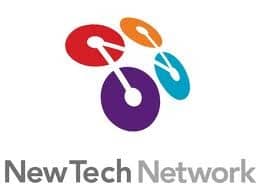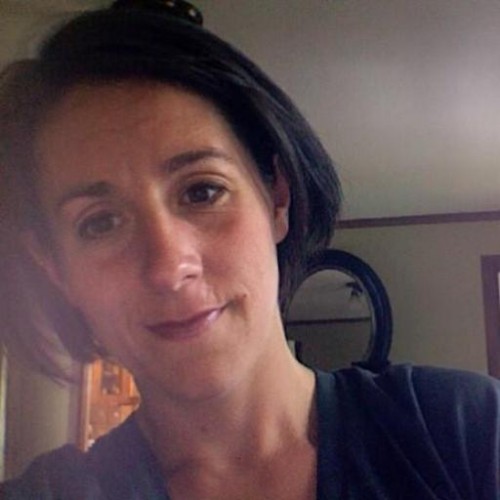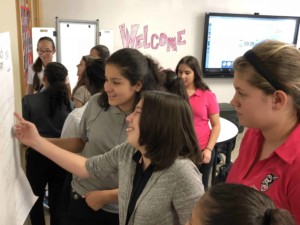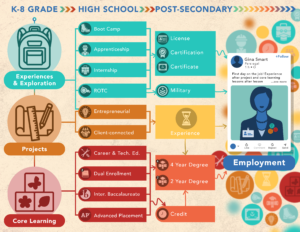New Tech Expands Online PBL Across Network

New Tech Network, 130 STEM schools in 23 states, launched Digital Learning@NTN last year with 2 online semester courses and 56 enrolled students from 15 different New Tech schools. The courses were the first to offer online learning as 100% project-based and grouped students in order to have collaborative learning experiences.
This year, with a grant from the Carnegie Corporation, NTN is expanding the program by offering 6 unique, yet STEM focused courses that students would not be exposed to in a typical high school curriculum: Astronomy, Physics, Transportation and Communication, Probability and Statistics, Sustainability by Design and “Where Will I Use This?” Mathematical Modeling- a math course for students not intending to major in mathematics in college. These subjects were chosen through a combination of interest in electives and access to exemplary teachers.
“All courses are designed and led by experienced New Tech facilitators, and offer students an opportunity to develop global awareness, online communication, technology, and agency skills– all critical attributes for success in college and careers.”
Last week, we talked to Jamie Sachs, Director of Digital Learning, to hear about her plans for the this year, as they plan to build their catalog by adding a minimum of five new courses every year. She told us she is excited about online learning again. She comes to NTN with extensive experience in online Charter schools and loves the idea of having these types of online courses offered to students.
The K-12 New Tech Network schools share Echo, a project-based learning learning management system. Each course at New Tech is made up of a series of projects (similar to units at other schools). Now scaling within Network schools are College Ready Assessments (CRA) embedded within projects which enable teachers to score individual student work, culminating in a rubric-scored performance assessment. Echo helps to ensure that each project is standards-based and aligned to Learning Outcomes and is rigorously scored. It also includes an extensive curated library of projects that teachers can use or adapt. Because Echo has some social learning features, New Tech can offer these courses online.
With the Carnegie Grant, these courses are free for students and the subjects were picked to meet student needs and interest. Next year, there will be a fee, but more courses will be offered and NTN is planning to open up enrollment outside of the network.
What makes students love these courses, is the fact that they are completely project based and they get to meet and work with students from across the country. Although they never meet in person, because they all attend NTN schools and use the Echo platform, they have a shared set of values, expectations, vocabulary and tools that make it instantly easy to communicate effectively. Students not only learn the content of the course, but master the skills necessary to collaborate online- an absolute essential skill for anyone planning to be successful in today’s workforce.
In fact, one of the biggest realizations that came out of the first year of Digital Learning @ NTN was learning that the professional communication/collaboration skills were equally as important as the subject matter of the course. This year, Jamie is focused on scaffolding these skills even more. The students will start the courses with multiple activities, leveraging multiple tools by which the students can use to communicate in creative but effective ways. When working online, there is never just one way to solve a problem, and these online yet project based courses open up a whole new level of deeper learning for the students.
Other lessons learned concerned the grouping of students. Not every NTN school is coming with the same background knowledge of what an online course looks like and not everyone grades on the same skills. Digital Learning had to get everyone on the same page, regarding expectations, grading, etc.
Also, connecting students in similar situations but living in completely different regions of the country, experiencing different climates, geographies and cultures offers a personal connection and great depth to the learning that students can’t find when reading from a text book. But, Jamie explains, they will be more intentional about grouping students at the start of the program- ensuring that students are in same time zone in order to minimize some the challenges communicating online inevitably imposes. The ultimate goal is to overcome the physical obstacles and create an awareness and diversity in the projects by recognizing the fact that the students are studying together from different regions of the country.
Significant work in shifting NTN schools from “fidelity to the model” to “student outcomes” as measure of success is being done and Digital Learning @ NTN aligns with this goal. Two years of development to support CCSS and aspire to 100% college/career ready graduates have culminated in a completely redesigned School Success Rubric, new standard Learning Outcomes for all schools and have set of 45+ rubrics aligned with each learning outcome for 5th, 8th and 9-12th grades. Echo continues to play significant role—new reporting tools also helping teachers and administrators use student data more effectively. Now with Digital Learning, students will be able to add a completely new category to their college/career application- “successful online communicator/learner.”







0 Comments
Leave a Comment
Your email address will not be published. All fields are required.